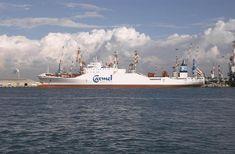
A trip to France is often laced with uncertainty and this one was no exception. French fishermen denied the Journal a look at Ecofresh by blockading the port for two days to protest at fuel prices, but an understandably distracted Jean Pierre Pachy was on hand to fill readers in on the unique concept that has trimmed the Israel-Marseille round-trip to seven days.
An Israeli enterprise first formed in 1998, with a view to substitute the old ships in the Agrexco fleet with new vessels that would transport agricultural produce under controlled conditions while reducing the costs of trans-shipment.
Last season was the first in operation for two new €35 million vessels Ecofresh and Biotop, which Agrexco has leased for a 15-year period, with an option to buy at the end of the contract. Ecofresh was launched on December 8, while its identical twin first sailed in March this year.
The journey time to Marseille has been reduced from four days and four hours to three days and seven hours, a massive difference in the perishable world. The five-day lead time to the UK is now beginning to compare very well with Spanish suppliers.
The new ships were built for non-tidal Mediterranean ports by German specialist MPC at the ENVC shipyards in Portugal. The weekly service calls at either Genoa or Valencia, and as well as the Italian and Spanish markets, produce for the entire continent enters through one of these three points.
Around 50 per cent of the volume that is transported to Europe through Marseille is eventually destined for the UK market. The vital statistics of both multi-purpose ships illustrate the bare benefits (see picture caption).
But Pachy says the integration of systems in Israel and France has borne immediate fruit. “This is a unique concept,” he says. “Everything is prototype. The shelf-life extension and efficiencies in the distribution process are huge and we have introduced the seafreight option for several product lines - including strawberries and herbs - thus reducing the airfreight burden.”
The warehouse stock management and unloading process is controlled by a centralised computer system managed by stevedore Leon Vincent. Each barcoded pallet is entered into the system once it has been loaded onto the ship in Ashdod. Adrienne Murphy at Leon Vincent then allocates a specific space in the quayside coldstorage facility for each pallet. Once the ship arrives, discharge is controlled totally by pre-ordained location planning, transmitted electronically to each forklift driver.
“We have integrated our warehouse management system with Agrexco’s MCBA system, and therefore begin to put an unloading plan in place three days before the vessel arrives in port,” says Murphy. “This is finalised in the last couple of days, taking into account any priorities or specified customer requests. Once the products are in the warehouse, we have a live stock control system that can be accessed by Agrexco’s offices around the world.
“It is a much more transparent process, the potential for human error has been reduced significantly, and it is far speedier.”
Pachy says: “The eventual aim is to discharge each vessel within 18 hours. The central system has done a wonderful job, although as with anything new there has been the odd glitch in the first few months. We have learned an awful lot in a short space of time and we’re through the teething problems now.”
The need to make the vessel pay with backloads to Israel meant a classical reefer vessel was not the preferred alternative. The 880 container slots add another 3,000 pallets of capacity to the ships. The sideloading vessels also offer the flexibility to work three gangs at once, one to discharge the six reefer chambers and another two to work on the front and rear decks simultaneously.
“Agrexco has believed in sideloaders for 25 years,” says Pachy. “Because the lid comes off a conventional hatch to discharge, the cold chain is disrupted from the first stage of the unloading process.” Two eight-pallet elevators speed up the unloading of each chamber, lifting the pallets onto a £1m on-shore conveyor, which runs on sensors to deliver the product to its desired destination.
“The only human interaction is from dockers inside the ship who pick up the pallets with a jack to load onto the elevators,” says Pachy. It takes about four minutes for each eight-pallet load to clear the process, all conducted within a continuous cool chain.
The reefer chambers were designed at 2.4 metres, rather than the conventional 2.2m, which has the dual advantage of giving slightly more capacity for each pallet and enhancing airflow around the product. It also, says Pachy, allows for a potential 10 per cent cost saving per pallet.
Compressors that work the width of the ship rather than the length and an airbag system that stops pallets from moving once they are set in place has improved cooling performance. “It all adds to the quality of the product when it reaches customers,” says Pachy. “Which will also reduce costs to growers and maximise potential returns.”
The backloading of products to Israel is a lucrative business. Every Carmel vessel that leaves Marseille contains a load of up to 600 cars under the terms of a deal struck with Jefco.
Buses, tanks, ceramics and heavy goods have also found their way onto the ships, but the most unlikely passengers have probably been alligators, being brought to France for Spanish reptile parks from a kibbutz in Israel.
Reptiles, tanks or fresh produce, the system can cope with the lot. “You can basically put anything in the system and it will be traceable all the way through,” says Pachy. Swimmers off the Mediterranean coasts will be glad of that guarantee.



